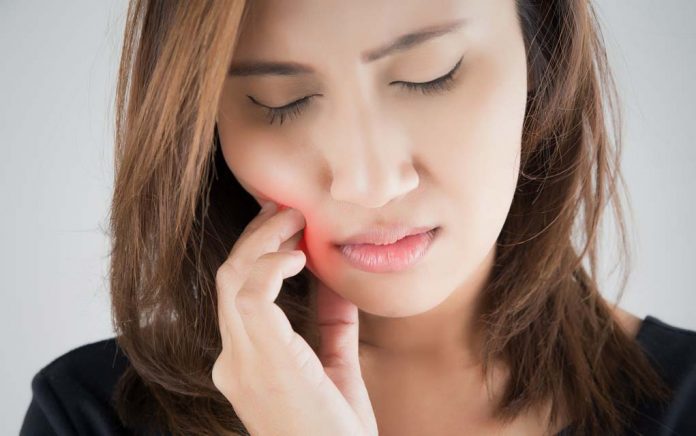
I was recently on vacation and met a fellow traveller who told me that his dad had died of complications from a tooth abscess. I remember thinking, “Who would imagine that something as small as a tooth infection could kill?”
Make no mistake, tooth abscesses are serious. They can cause the death of the tooth, infect the soft tissues of your mouth and eat away at your facial bones. The poisons can into your bloodstream and may lead to serious illness or even death. Never leave a tooth abscess alone, get to a dentist ASAP.
Abscessed teeth are generally either chronic or acute. Chronic tooth ache usually has a low to medium grade throbbing in a particular tooth or area around a tooth. Acute tooth abscess has a rapid, painful onset. Some of the symptoms of tooth abscess are: tooth ache – sharp pain or continuous throbbing pain; pain during chewing; spontaneous pain; pain from hot or cold substances that lingers long after the source is gone; a foul taste and/or bad smell in mouth; possible fever and possible swollen glands.
I myself have gone through the agony of an abscess and it is one of the most distractingly painful things I can remember. You can’t eat, sleep, or concentrate – all you can do is take measures to relieve the pain and go to the dentist right away. At the time of my abscess, I was very fortunate to have a dentist that hailed from Denmark who did not believe in overprescribing antibiotics and advised me to use clove oil. Lo and behold, it worked – the pain was instantly gone, and the infection began to subside! The dentist was then able to perform a root canal and all has been well since.
Eugenol, a component of clove, is an integral part of the dentist's kit due to its analgesic, local anaesthetic, anti-inflammatory, and antibacterial effects. It is used in the form of a paste or mixture as dental cement, filler, and restorative material. Clove oil is an old remedy for tooth problems that is still used as an anaesthetic by dentists in Germany, where it has gone through clinical trials that confirm its effectiveness.
If you end up with a toothache, why not try a clove before heading to the dentist? The safest way to use it is by holding a whole clove at the site of the ache, or nibbling on it until it’s been chewed up, then spitting out the bits. A maximum of one clove can be used. Clove oil is very powerful, and can cause irritation. An alternative to using the whole clove is to soak a piece of cotton wool in a mixture of one drop clove oil in a teaspoon of olive oil and hold it on the abscessed area.
I have also found that swallowing a few drops of clove oil in a bit of water for a few days when I’m starting to feel a little under the weather works wonders at keeping germs at bay. I can almost always avoid the latest illnesses going around. Cloves are rich in calcium, iron, phosphorus, sodium, potassium, and vitamins A and C.
Aside from dental care, there are other health benefits of clove oil, including the following:
- Infection: Due to its antiseptic properties, clove is very good at treating infection.
- Insect Bites and Stings: Clove oil can be used to repel mosquitoes, and to treat insect bites and stings. Clove oil is very strong so it should be diluted and avoid using it on sensitive skin.
- Skin Care: Clove oil has been shown to be especially helpful for acne patients.
- Stress: Clove oil has a stimulating effect on the mind and relieves mental exhaustion and fatigue. When taken internally, in appropriate amounts, it can refresh the mind and help treat mental problems such as memory loss, depression and anxiety.
- Headache: Clove oil, when mixed with salt and applied on the forehead, gives a cooling effect and helps relieve headache.
- Respiratory Problems: Clove oil has an anti-inflammatory effect that can clear the nasal passage. This expectorant is useful in treating various respiratory disorders including coughs, colds, bronchitis, asthma and sinusitis. Chewing a clove bud eases sore throats.
- Earache: A mixture of warm clove oil and sesame oil applied to the ear can help alleviate earaches.
- Premature Ejaculation: Research has indicated that clove can be useful for treating premature ejaculation. However, further research needs to be carried out to confirm these results.
- Indigestion: Clove oil can be used to treat stomach related problems such as hiccups, indigestion, motion sickness, and flatulence. Hence, clove is one of the important spices added in Indian dishes. However, gastrointestinal irritation can occur in sensitive individuals.
- Blood Circulation: Clove oil’s anti-inflammatory effects can increase blood circulation.
Whether its for prevention or a current health issue, clove oil may be great for you.
References
Eagles, Susan. “Tooth Abscess!”, Richters Herb Specialists, http://www.richters.com/newdisplay.cgi?page=home.html&cart_id=6065406.18020 (Mar 26 2009)
Dental Health Index. “A tooth abscess is extremely painful”, http://www.dental-health-index.com/toothabscess.html (Mar 26 2009)
Medline Plus. “Clove (Eugenia aromatica) and Clove oil (Eugenol)”, (Mar 26 2009)
PubMed. “Formulation and evaluation of mucoadhesive tablets containing eugenol for the treatment of periodontal diseases”, http://www.ncbi.nlm.nih.gov/pubmed/15089054?dopt=Abstract (Mar 26 2009)










